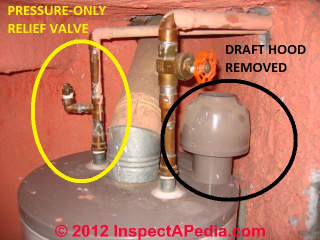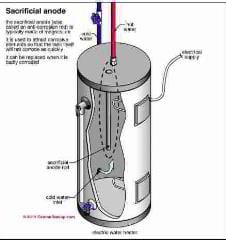 Water Heater Defects List & Home Inspection Education
Water Heater Defects List & Home Inspection Education
- POST a QUESTION or COMMENT about home inspection education curriculum for inspecting water heaters
This article lists significant residential & light commercial water heater defects, definitions, and home inspection education topics.
This article series, beginning at BUILDING DEFECTS LISTS, provides lists of common building defects and basic defect knowledge that also outline recommended curriculum content for home inspector education. The building defects and inspection points listed in these articles also guide homeowners and home buyers to building areas that merit careful attention and often point areas of safety concern or important maintenance and repair tasks.
InspectAPedia tolerates no conflicts of interest. We have no relationship with advertisers, products, or services discussed at this website.
- Daniel Friedman, Publisher/Editor/Author - See WHO ARE WE?
Home Inspection Education Curriculum - Water Heaters
The sketch shown at left was provided provided courtesy of Carson Dunlop Associates
These curriculae and building defect lists are based on smilar curriculum documents first prepared by Joe Scaduto, an ASHI member who prepared course material for Northeastern University's Building Inspection Certificate program in 1988, subsequently by DF, InspectApedia's editor, for New York University ca 1988 and later, with others, recommended to ASHI, the American Society of Home Inspectors.
ASHI did not adopt this material though currently that association as well as others offer extensive HOME INSPECTOR EDUCATION material. The curriculum and lists of defects are informed by additional analysis of the process of home inspection that was developed beginning Calgary, AB for Canadian and U.S. home inspector education and certification examinations in 1997. Other early contributors to home inspection education in the U.S. and Canada include Dr. Jess Aronstein, Alan Carson, Mike Casey, Mark Cramer, John Cox, Dwight Barnett, Douglas Hansen, Rick Heyl, Larry Hoytt, Bill Merrill, Kevin O'Malley, Dennis Robitalille, Keith Peddie, Pat Porzio, Roger Robinson.
6.2 Water Heaters: home inspection recommendations, typical defects list
6.2.1 Knowledge Base for Inspecting Water Heaters
1. Describe the function of residential water heaters.
2. Describe the three most common fuels used in water heaters.
3. List the materials and components of gas, oil, electric water heaters.
4. Describe the features of adequate installation and repair technique for water heaters.
5. Define the following terms as they relate to water heaters:
pressure relief valve, temperature/pressure relief valve, sacrificial anode, recirculating system, single pass, dip tube, recovery rate, glass lined tanks, vacuum relief valve, burner, heat exchanger, baffle (turbulator), draft hood, vent connector, external (floating) tank, refractory, thermostat, isolating valve, drain valve, superheated water, discharge tube, temperature cut-outs, energy cut-out (ECO), high efficiency water heater, direct vent system, combination system, tempering (mixing) valve, tankless coil, instantaneous water heater, fan-assisted (power vented) water heater.
6. Outline the typical life expectancy of domestic water heaters.
7. Identify the codes or standards which apply to water heaters in your area (gas, oil and electric).
6.2.2 Inspection skills for Inspecting Water Heaters
1. Describe the inspection procedures for domestic water heaters.
2. Identify the common defects listed on the next page.
3. Describe the implications of each defect.
4. Identify the safety issues for the inspector and the occupant of the house (gas explosion, oil fire, steam explosion, electric shock).
5. Communicate findings to client verbally and in writing, recommending corrective actions where needed.
WATER HEATER TYPICAL DEFECTS
ELECTRIC WATER HEATERS, Typical Defects
GAS Fired Water Heaters, Typical Defects
Also see GAS FIRED WATER HEATERS
GAS BURNERS AND VENTING, Typical Defects
GAS METERS, Typical Defects
• Gas shut off and locked
• Ice
• Leak
• Mechanical damage
• Poor access
• Poor location
• Rust
• Undersized
GAS BURNERS on Water Heaters, Typical Defects
• Delayed ignition
• Dirt or soot
• Gas odor or leak
• Inoperative
• Poor flame color or pattern
• Rust
• Scorching
• Short cycling
Gas Water Heater COMBUSTION AIR, Typical Defects
• Inadequate combustion air
• Inadequate combustion air when utility room door shut
• CO alarms sounding, sooting, odors
Water Heater GAS PIPING , Typical Defects
• Copper tubing not properly labeled
• Improper connections
• Inadequate support
• Inappropriate materials
• Leak
• Missing shut off valves
• No drip leg
• Piping in chimney or duct system
• Plastic pipe exposed above-grade
• Rust
Gas Water Heater Heat Shields, Typical Defects
• Loose
• Rusted
• Missing
• Scorched
Gas Water Heater VENTING SYSTEMS, Typical Defects
• Improper material
• Inadequate combustible clearance
• Poor support
• Poor connections
• Poor manifolding
• Poor slope
• Rust, dirty, obstructed
• Spillage or backdrafting at the draft hood
• Too long
• Vent connector extends too far into chimney
• Vent connector too small, too big for water heater
OIL BURNER AND VENTING, Typical Defects
Also see OIL FIRED WATER HEATERS
OIL STORAGE TANKS OIL BURNERS AND REFRACTORIES, Typical Defects
• Empty • Dirt or soot
• Leak • Excess noise or vibration
• Not suitable for outdoor use • Incomplete combustion
• Poor location • Inoperative
• Rust • Leak
• Underground • Poor flame color pattern
• Refractory problems
• Rust
FILL AND VENT PIPES, Typical Defects
• Scorching
• Abandoned • Too close to combustibles
• • OIL BURNER NOISE SMOKE ODORS
• Damaged or corroded
• Leak PRIMARY CONTROLLER, Typical Defects
• Missing caps
• Inoperative
• Missing
• Tripped
OIL SUPPLY LINES, Typical Defects
• Corrosion, mechanical damage, BAROMETRIC DAMPERS/DRAFT REGULATORS, Typical Defects
crimped
• Leak
• Undersized • Improper location
• Unprotected • Inadequate draft air
• Inoperative
OIL FILTERS • Misadjusted
• Missing (often not needed)
• Dirty • Rust
• Leak • Spillage
• Missing
COMBUSTION AIR, Typical Defects
• Inadequate VENTING SYSTEMS, Typical Defects
• Improper material
• Inadequate combustible clearance
• Loose connections
• Poor support
• Poor slope
• Poor insertion into chimney
• Poor manifolding
• Rust, dirty, obstructed
• Too small or too big
• Too long
CONVENTIONAL TANK TYPE WATER HEATERS, Typical Defects
• Baffle collapsed or missing (gas or oil)
• Damaged tank
• Drain valve problems
• Gas burner cover or roll out shield
missing, damaged, rust
• Hot and cold piping reversed
• Inadequate combustible clearance
• Inadequate capacity or recovery rate
• Inoperative
• Insulation obstructing combustion air
or draft hood (gas or oil)
• Leak
• Low water pressure and flow
• No isolating valve
• Noisy water heater
• Poor location –
– Bedrooms
– Bathrooms
– Closets
• Propane water heater in low area
• Rust
• Tank wobbly or not stable
• Temperature/pressure relief valve problems
• Not raised if in garage
CIRCULATING PUMPS - hot water circulating systems for instant hot water, Typical Defects
• Improper arrangement
• Inoperative
• Leak
• Overheating or excess noise or vibration
COMBINATION HEATING SYSTEMS, Typical Defects
Also see WATER HEATERS for HOME HEATING USE?
• No hot water or inadequate hot water
• Tempering valve missing, set improperly
• Water too hot
TANKLESS COILS, Typical Defects
Also see TANKLESS COILS
• Leak
• Poor hot water pressure or flow (clogged?)
• Rust
• Tempering valve —
– Defective
– Missing
– Set wrong
Demand Water Heaters = Instant Water Heaters = Tankless Water Heaters, Typical Defects
Also see HOME & BUILDING INSPECTORS & INSPECTION METHODS. Use the Search Box at the top or bottom of these pages to find in-depth information about building, energy savings, and indoor environment inspection, diagnosis and repair at this website.
Watch out: these inspection lists do not list all possible defects for the systems discussed, and not all home or building inspectors will examine all of the items listed here. CONTACT us to suggest corrections or additions to articles at this website.
...
Continue reading at WATER HEATERS or select a topic from the closely-related articles below, or see the complete ARTICLE INDEX.
Or see these
Recommended Articles
- ARTICLE INDEX to WATER HEATERS
- BUILDING DEFECTS LISTS - home
- GAS PIPING, VALVES, CONTROLS
- MIXING / ANTI-SCALD VALVES
- OIL TANKS INSPECT LEAK TEST ABANDON REGS
- OIL & GAS PIPING
Suggested citation for this web page
DEFECTS LIST - WATER HEATERS at InspectApedia.com - online encyclopedia of building & environmental inspection, testing, diagnosis, repair, & problem prevention advice.
Or see this
INDEX to RELATED ARTICLES: ARTICLE INDEX to BUILDING & HOME INSPECTION
Or use the SEARCH BOX found below to Ask a Question or Search InspectApedia
Ask a Question or Search InspectApedia
Questions & answers or comments about home inspection education curriculum for inspecting water heaters.
Try the search box just below, or if you prefer, post a question or comment in the Comments box below and we will respond promptly.
Search the InspectApedia website
Note: appearance of your Comment below may be delayed: if your comment contains an image, photograph, web link, or text that looks to the software as if it might be a web link, your posting will appear after it has been approved by a moderator. Apologies for the delay.
Only one image can be added per comment but you can post as many comments, and therefore images, as you like.
You will not receive a notification when a response to your question has been posted.
Please bookmark this page to make it easy for you to check back for our response.
IF above you see "Comment Form is loading comments..." then COMMENT BOX - countable.ca / bawkbox.com IS NOT WORKING.
In any case you are welcome to send an email directly to us at InspectApedia.com at editor@inspectApedia.com
We'll reply to you directly. Please help us help you by noting, in your email, the URL of the InspectApedia page where you wanted to comment.
Citations & References
In addition to any citations in the article above, a full list is available on request.
- John Cranor [Website: /www.house-whisperer.com ] is an ASHI member and a home inspector (The House Whisperer) is located in Glen Allen, VA 23060. He is also a contributor to InspectApedia.com in several technical areas such as plumbing and appliances (dryer vents). Contact Mr. Cranor at 804-873-8534 or by Email: johncranor@verizon.net
- Mark Cramer Inspection Services Mark Cramer, Tampa Florida, Mr. Cramer is a past president of ASHI, the American Society of Home Inspectors and is a Florida home inspector and home inspection educator. Contact Mark Cramer at: 727-595-4211 mark@BestTampaInspector.com 11/06
- Roger Hankey is principal of Hankey and Brown Inspections, Winter Park, CO. Mr. Hankey is a past chairman of the ASHI Standards Committee and served in other ASHI chapter and national leadership roles. Mr. Hankey is a National Radon Proficiency Program certified measurement professional and a Level II infrared thermographer. Contact Roger Hankey at: 970-393-6604 - rogerhankey47@gmail.com . Website: www.HankeyandBrown.com Mr. Hankey is a frequent contributor to InspectAPedia.com.
- Arlene Puentes [Website: www.octoberhome.com ] , an ASHI member and a licensed home inspector in Kingston, NY, and has served on ASHI national committees as well as HVASHI Chapter President. Ms. Puentes can be contacted at ap@octoberhome.com
- Building Pathology, Deterioration, Diagnostics, and Intervention, Samuel Y. Harris, P.E., AIA, Esq., ISBN 0-471-33172-4, John Wiley & Sons, 2001 [General building science-DF] ISBN-10: 0471331724 ISBN-13: 978-0471331728
- In addition to citations & references found in this article, see the research citations given at the end of the related articles found at our suggested
CONTINUE READING or RECOMMENDED ARTICLES.
- Carson, Dunlop & Associates Ltd., 120 Carlton Street Suite 407, Toronto ON M5A 4K2. Tel: (416) 964-9415 1-800-268-7070 Email: info@carsondunlop.com. Alan Carson is a past president of ASHI, the American Society of Home Inspectors.
Thanks to Alan Carson and Bob Dunlop, for permission for InspectAPedia to use text excerpts from The HOME REFERENCE BOOK - the Encyclopedia of Homes and to use illustrations from The ILLUSTRATED HOME .
Carson Dunlop Associates provides extensive home inspection education and report writing material. In gratitude we provide links to tsome Carson Dunlop Associates products and services.


